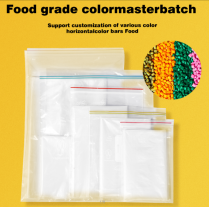biodegradable heat seal bags
Biodegradable Heat Seal Bags A Sustainable Future for Packaging
In recent years, the conversation surrounding environmental sustainability has gained momentum, prompting businesses to explore eco-friendly alternatives in their packaging solutions. One such innovation is biodegradable heat seal bags, designed to reduce the ecological footprint while maintaining functionality and convenience.
Biodegradable heat seal bags are made from materials that can break down naturally over time, significantly lessening their impact on the environment compared to traditional plastic bags. These bags often utilize plant-based polymers or other biodegradable materials that decompose through natural processes, transforming back into organic matter. This characteristic is essential in a world grappling with plastic pollution, where millions of tons of plastic waste end up in landfills and oceans each year.
The heat seal process creates an airtight seal, ensuring product freshness and safety. This technology is widely used in various industries, including food packaging, pharmaceuticals, and consumer goods. By switching to biodegradable options, companies not only contribute to environmental protection but also appeal to a growing consumer base that prioritizes sustainability. Today’s consumers are increasingly aware of their purchasing decisions, preferring products that align with their values regarding environmental stewardship.
biodegradable heat seal bags

Moreover, the application of biodegradable heat seal bags is diverse. In the food industry, these bags can store a wide range of products, maintaining their quality while promoting an eco-friendly image. For retailers, using biodegradable bags in packaging can enhance brand reputation, thus attracting a loyal customer base that prioritizes sustainability. Many businesses are also discovering that transitioning to biodegradable options does not sacrifice quality or performance. These bags are designed to be robust, secure, and fit for purpose, ensuring that they compete effectively with their non-biodegradable counterparts.
Despite the advantages, there remain challenges in the widespread adoption of biodegradable heat seal bags. The availability of materials, cost implications, and the need for proper disposal facilities are aspects that manufacturers and businesses need to consider. However, ongoing advancements in technology and increased market demand are paving the way for more efficient production methods and wider accessibility.
In conclusion, biodegradable heat seal bags represent a crucial step towards sustainable packaging solutions. By embracing these eco-friendly alternatives, businesses can significantly reduce their environmental impact while meeting consumer demands for sustainable products. As innovation continues in this field, the hope is for a future where sustainable packaging becomes the norm rather than the exception, contributing to a healthier planet for generations to come.
-
Self Seal Bags: Secure, Clear, and Customizable Packaging for Every IndustryNewsAug.15,2025
-
Paper Cups: Bulk Solutions for Events, Cafés, and Eco-Friendly ServiceNewsAug.15,2025
-
Laminated Bags: Durable, Customizable Packaging for High-Impact BrandsNewsAug.15,2025
-
Grocery Bags: Smart, Sustainable, and Scalable Solutions for RetailersNewsAug.15,2025
-
Drawstring Bags: Versatile, Customizable, and Cost-Effective for Bulk UseNewsAug.15,2025
-
Disposable Gloves: Wholesale Solutions for Safety, Hygiene, and EfficiencyNewsAug.15,2025
-
Have the freedom of customizing your custom mailers any way you want! Our dedicated packaging support will help deliver you the mailing experience you need to elevate your shipping experience to the next level! Start making a strong impression on your customers and stand out from your competitors! -
LIYA uses high quality raw materials which directly purchased from large enterprises domestic and overseas such as PetroChina, Sinopec, Sabic, Equate, ExxonMobil, Dow Chemical, Total, and Borouge, ensuring the price advantage and quality of the raw materials. -
LIYA uses high quality raw materials which directly purchased from large enterprises domestic and overseas such as PetroChina, Sinopec, Sabic, Equate, ExxonMobil, Dow Chemical, Total, and Borouge, ensuring the price advantage and quality of the raw materials.





